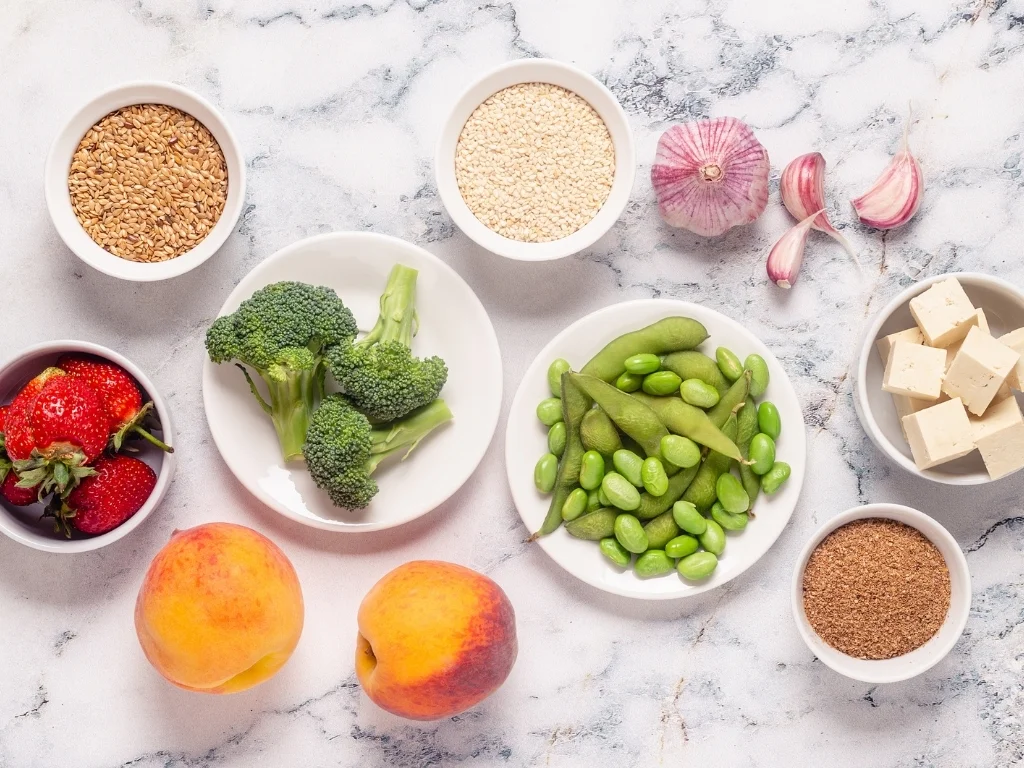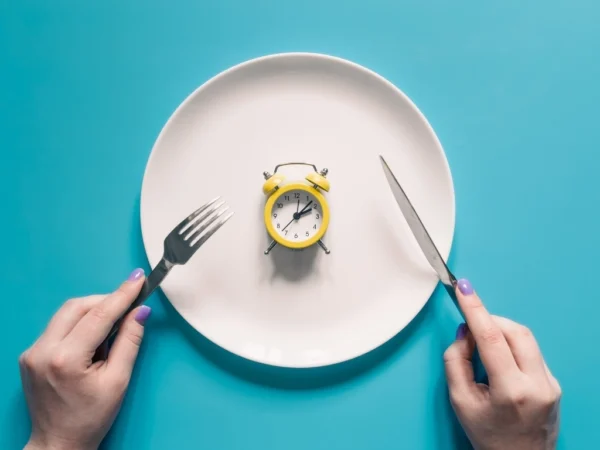Menopause is a natural stage of life that often brings major changes to the body. Shifts in hormones, muscle mass, metabolism, and fat distribution may be challenging at times, but these also create an opportunity to explore new ways of caring for your body.
One of the most effective approaches is to plan your meals more mindfully. Consuming menopause-supporting foods not only keeps you energized but also supports weight management and long-term health.
To make this easier, we’ve prepared a 7-day diet plan for menopause that shows how simple, everyday foods can bolster your health.

Why you may need to adjust your diet during menopause
During menopause, shifts in hormone levels — particularly a drop in estrogen — can cause your metabolism to naturally slow down. As a result, your body may burn 250 to 300 fewer calories per day, even if your food portions and exercise habits stay the same.
Over time, this can result in weight gain around the abdomen, where fat is more likely to accumulate during this stage of life.
Lower estrogen levels, compounded by the natural aging process, can also cause muscle mass to decline. Since muscle burns more calories than fat, having less of it means your body becomes less efficient at using energy, increasing the likelihood of weight gain.
But excess weight isn’t the only reason to rethink nutrition at this stage. The gradual loss of muscle and bone density drums up the risk of osteoporosis, while changes in cholesterol and insulin sensitivity during menopause can lead to heart disease and type 2 diabetes.
Diet also plays a role in how you experience menopause. Poor sleep, hot flashes, and higher levels of stress may drive cravings for high-calorie foods, making weight difficult to manage.
On the other hand, certain dietary choices can make common symptoms worse. Foods high in sodium, trans fats, and refined sugar, caffeine, and alcohol are known to trigger or intensify hot flashes, night sweats, inflammation, mood changes, and bloating. Highly processed foods, like potato chips and packaged sauces, can have the same effect.
Fortunately, these changes aren’t irreversible. With the right nutrition and lifestyle changes, such as adopting a menopause weight loss diet plan and working with a registered dietitian, you can regain control and feel your best throughout this transition.
What does proper nutrition look like during menopause?
Eating well is essential for staying healthy during menopause. Proper nutrition can help manage symptoms — including gradual weight gain and muscle loss — more effectively, boosting your overall well-being.
Instead of observing rigid rules, opt for a well-balanced diet that gives your body the nutrients it needs. Start with the following pointers:
- Prioritize your proteins: Make sure to include lean proteins in every meal to combat muscle loss.
- Go for complex carbohydrates: Choose whole grains instead of refined carbs for better energy and blood sugar control.
- Add (natural) color to your pantry: Colorful fruits and vegetables tend to be richer in fiber, vitamins, minerals, and antioxidants.
- Don’t neglect your bone health: Add calcium and vitamin D–rich foods to strengthen your bones and lower the risk of osteoporosis.
- Cut down on empty calories: Limit added sugars and processed foods, as these can greatly contribute to weight gain.
- Practice portion control: Stay mindful of your portions and aim for balance when filling your plate.
- Be informed: Learn what foods you can eat (and what to limit) during menopause to make meal planning more effective.
- Think long-term: Work towards turning these into habits you can realistically sustain for lasting results.
The following 7-day diet plan for menopause was designed to empower you to feel stronger, more confident, and ready to embrace this chapter with resilience and grace. Head over to the next section to get cooking!

Free 7-day diet plan for menopause to guide your meals
You don’t have to compromise taste or spend hours in the kitchen, all in the name of nourishment. By understanding the basic building blocks of a balanced meal, you can easily create dishes that support your wellness, energy, and weight loss goals.
To get you started, here’s a simple, structured 7-day diet plan for menopause. Each day covers four meals: breakfast, lunch, dinner, and a snack, featuring a mix of lean proteins, fiber-rich carbs, healthy fats, calcium-rich foods, and other nutrient-packed foods.
Using everyday ingredients you can find at almost any grocery store, the following meals are designed to be both practical and accessible. This diet plan is for elderly females who want a realistic, balanced approach that fits seamlessly into daily life.
Day 1
- Breakfast: Greek yogurt with fresh blueberries, chia seeds, and a sprinkle of walnuts
- Lunch: Whole-grain pasta tossed with roasted chicken and vegetables and a drizzle of olive oil
- Dinner: Baked salmon with a side of steamed cauliflower, sweet potato, and broccoli
- Snack: Cucumber slices with tzatziki dip
Day 2
- Breakfast: Overnight oats with flaxseed, raspberries, and calcium-fortified soy milk
- Lunch: Hearty lentil soup with a side of mixed greens and whole-grain toast
- Dinner: Turkey stir-fry with brown rice, bok choy, and mushrooms
- Snack: Whole-grain crackers with low-fat cheese
Day 3
- Breakfast: Vegetable omelet with peppers, spinach, and feta cheese
- Lunch: Tuna and white bean salad with arugula, cucumbers, and olive oil
- Dinner: Grilled chicken breast, roasted Brussels sprouts, and wild rice
- Snack: Orange slices and pistachios
Day 4
- Breakfast: Green smoothie with kale, banana, soy protein powder, and fortified oat milk
- Lunch: Chickpea and avocado wrap with tomato, lettuce, and a whole-grain tortilla
- Dinner: Baked salmon with roasted carrots, green beans, and quinoa
- Snack: Almonds and dried figs
Day 5
- Breakfast: Whole-grain toast with peanut butter (or any nut butter of your choice), chia seeds, and fresh strawberries
- Lunch: Mediterranean grain bowl with grilled vegetables, hummus, and feta cheese
- Dinner: Lean beef and vegetable stew (with optional sweet potatoes)
- Snack: Lightly salted edamame pods
Day 6
- Breakfast: Calcium-fortified cereal with milk, flaxseeds, and banana slices
- Lunch: Grilled turkey burger with no bun (or with a whole-grain bun, alternatively) with a side salad and berries
- Dinner: Shrimp and vegetable stir-fry over soba noodles
- Snack: Hard-boiled egg with carrot sticks
Day 7
- Breakfast: Apple pie-inspired overnight oats with cinnamon and walnuts
- Lunch: Tofu and vegetable miso soup with a side of whole-grain rice
- Dinner: Roast chicken with kale side salad and lentils
- Snack: Greek yogurt topped with fresh figs and sunflower seeds

Let a Health Loft dietitian make your diet plan enjoyable, not restrictive
This diet plan can be a great first step towards better health, but it’s only one part of the bigger picture. Every woman’s needs, preferences, and health goals are unique, especially during this crucial time. For example, a diet plan for over 60 females may look different than one tailored for women in their 40s or 50s, since nutritional needs change with age.
While a 7-day diet plan for menopause offers helpful guidance, lasting results come from making sure your choices align well with what your body truly requires. This means considering your medical history, day-to-day lifestyle, personal preferences, and long-term wellness goals.
By working with a Health Loft registered dietitian for menopause and perimenopause, you’ll receive a tailored nutrition plan designed to ease your symptoms while supporting your overall well-being.
Additionally, Health Loft dietitians and nutritionists are in-network, which means you can access our telehealth consultations for as low as $0, depending on your coverage. Connect with a dietitian to discover how personalized nutrition guidance can help you thrive through menopause — and why Health Loft is the right team to support you.
This article was reviewed by Adrienne DePaul, MS, RDN. It is intended for informational purposes only and does not replace personalized nutritional advice.













